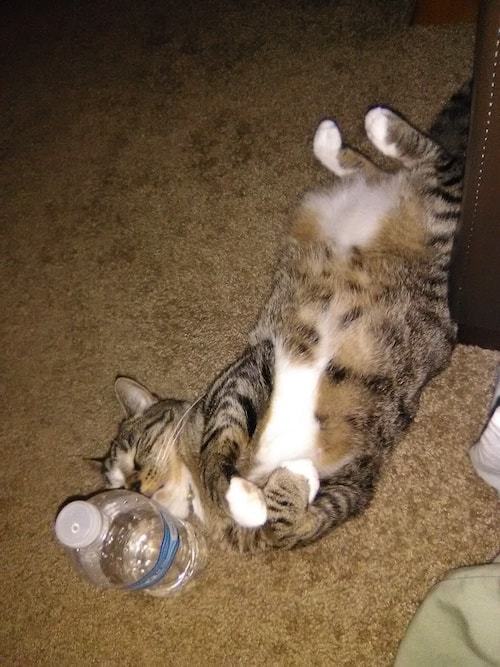Question: I just moved to a new place and now my cat won’t eat. How can I help him?
So I just moved in with my boyfriend on Sunday and I brought my cat along of course. For some reason, he is not eating or drinking of what I know of. Food/water hasn’t been touched. I’m really worried about my cat. He uses the litter box but he hasn’t eaten since 5 pm Sunday and today is Wednesday. I’m honestly really scared. But he’s getting more comfortable being here like he will walk around and want attention like normal. He just doesn’t seem interested in food. I’ve tried giving him wet food, dry, I’ve tried treats, even human food.
–Sniper Brittani
Answer:
Dear Brittani,
Moving to a new home is a big deal for a cat. When you think about it, indoor cats see very little of the world outside the home where they live. Moving to a new house is like moving to a new planet. Cats can react with fear and anxiety to this sort of drastic change.

Cats Who Don’t Eat Are at Risk
A cat who has gone without eating for more than a day or so is at risk for developing fatty liver disease (hepatic lipidosis). This happens when the body metabolizes fat stores for energy.
The liver plays a large role in converting fat to energy. The organ can become overwhelmed and get congested. Feline hepatic lipidosis can lead to serious illness if not treated aggressively.
To reduce the risk of developing hepatic lipidosis, a cat must get some nutrition right away. As an emergency measure, I have people use a syringe or a spoon to give their cat Gerber Chicken & Gravy baby food by mouth. It’s OK to mix in a bit of water to make it a better consistency for syringe feeding.
For an average 10 pound cat, I have people aim for feeding one 2.5 oz. jar on the first day and work up to two 2.5 oz jars per day. This should not be used as a long-term diet. A cat who is still unwilling to eat on his own after a couple of days of assisted feeding needs to see a veterinarian.
Cheer-Up Squad to the Rescue
Aside from feeding, you need to take some steps to help your cat feel more at home in his new surroundings. Here is some general advice for anxious cats in a new home:
- Don’t allow your cat to hide away from you and household activity. Bring him out and give him attention.
- Block off hiding areas where you aren’t able to easily bring him out.
- Use a Feliway diffuser for a few weeks. This product diffuses a feline pheromone through the air that decreases anxiety-related behaviors in cats.
- Increase interactive play with your cat. Now is your chance to pour on the charm. Bring out all his favorite toys. Many cats love chasing the light of a laser pointer. Try giving him a new cardboard box or paper grocery bag to play in. The happiness state of mind helps cats feel better and makes them more likely to eat.
- Don’t fret and worry when you’re around him. Cats can pick up on your mood and this can add to his own anxiety.
If you follow all these suggestions and your cat still doesn’t want to eat on his own, it’s time to take a trip to the vet’s office. Your veterinarian will be able to check for hepatic lipidosis and give the proper treatment to get your buddy back on the road to health.
Regards,
TB Thompson DVM
Disclaimer: Your use of the Ask The Vet feature is subject to the Ask The Vet Terms of Use.
Featured Image Credit: Elena Kutepova, Shutterstock
















